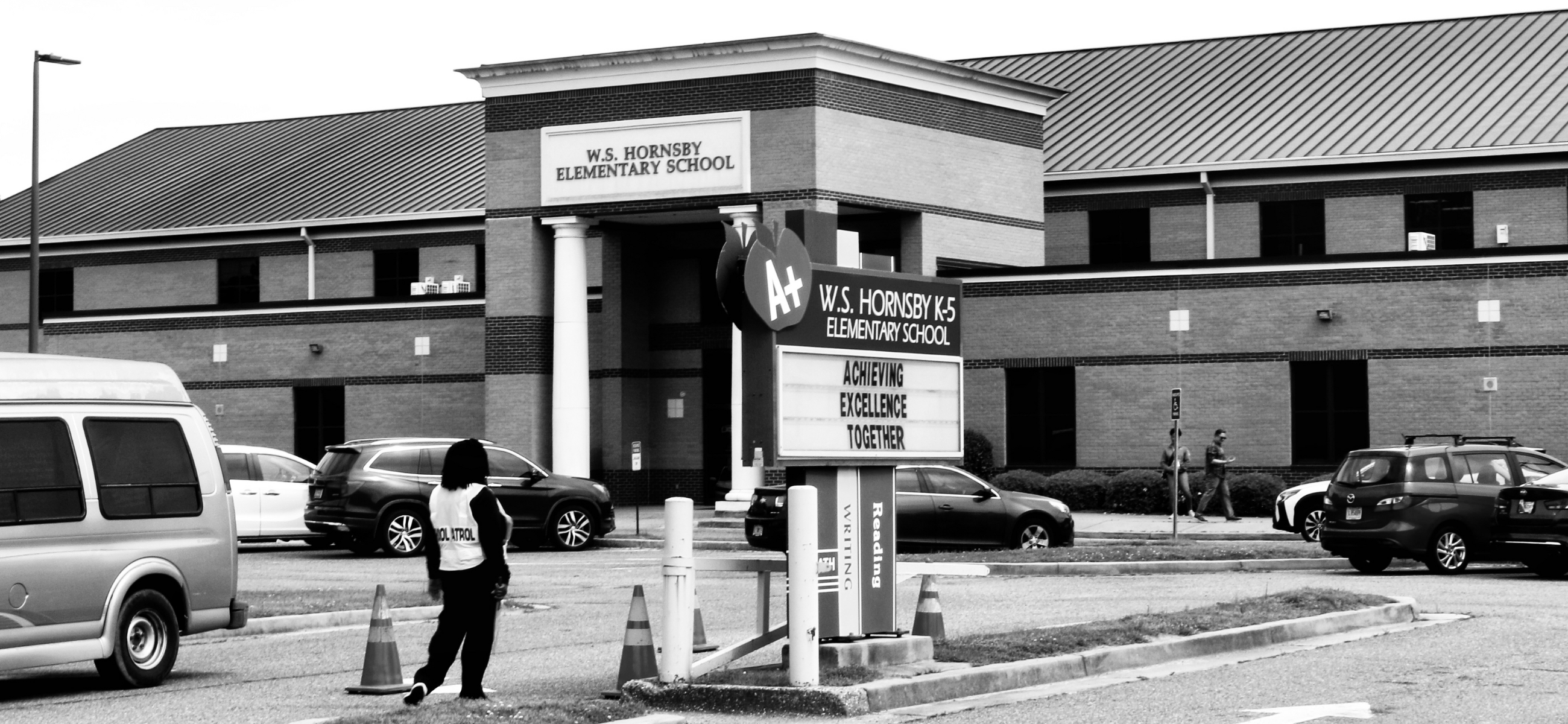Stay ahead of the curve as a political insider with deep policy analysis, daily briefings and policy-shaping tools.
Request a DemoGeorgia’s school rating system returns. Here’s why it matters

W.S. Hornsby Elementary School in Augusta, Georgia, serves 642 students in grades kindergarten through fifth. (Credit: Michael Johnson)
Gist
State Department of Education officials have quietly resumed tracking the well-being of Georgia’s more than 2,300 public elementary, middle and high schools after a three-year hiatus.
Georgia’s School Climate Star Rating system was put on hold during the COVID-19 pandemic while schools relied on remote learning. Students were at home, so the school climate couldn’t be fully assessed, according to officials.
The school climate rating system is a diagnostic tool that helps state education leaders gauge whether a school provides a good, safe environment for learning. It doesn’t measure academic achievement.
Teachers, parents and students have until March 1 to complete surveys used to compile school climate ratings. The system uses data from the Georgia Student Health Survey, Georgia School Personnel Survey, Georgia Parent Survey, student discipline data and attendance records for students, teachers, staff and administrators.
“We’re very pleased the Department of Education is resuming the rating,” said Michael Waller, executive director of Georgia Appleseed Center for Law & Justice, a nonprofit child advocacy group in Cobb County that works to keep kids in school. “It’s an important way for schools to show the community what they are achieving beyond just academics. Most Georgia schools are trying to create positive learning environments for their kids, and the rating helps them do that.”
What’s Happening
Here’s how the School Climate Star Rating works: Each school receives one to five stars. Five stars indicates an excellent school climate, whereas one star signals a dire need for improvement.
Georgia was the first state to use school climate ratings as an early indicator in its College and Career Ready Performance Index, an academic accountability system. School climate ratings help state education officials gauge whether a school is improving.
Georgia is one of only a dozen states where school climate surveys are required in all K-12 public schools, according to the National Association of State Boards of Education.
Why It Matters
Students and schools throughout Georgia and the nation are increasingly under siege in and out of the classroom. School shootings and the ensuing trauma affect students, teachers, parents and administrators whether the attack is on their campus or across the country. Complicating matters, experts say, are teacher and staff shortages, pandemic-related fatigue and a surge in student behavioral problems.
Georgia has over a million children in 180 school districts, each with its own set of education levels, concerns and issues.
The School Climate Star Rating gives education leaders a glimpse into how parents, students and school employees view their experience at school. It reflects norms, goals, values and interpersonal relationships, as well as teaching and learning practices.
The rating system was created after a decadeslong effort to curb bullying incidents and out-of-school suspensions. During the 2009-10 school year — around the time school climate reform was taking shape — about 142,000 kids, or 8.1% in K-12 statewide, received out-of-school suspensions, according to Georgia Department of Education records. By 2022, the number of suspensions had dropped to 6.5%, or 118,000 kids. Some child advocates credit school climate ratings for the improvement.
State Affairs visited schools in Augusta last year to better understand how the school climate rating system works. Augusta — which is in Richmond County — had schools with five-star and one-star ratings, only feet apart. Richmond County has about 29,000 students and 60 schools.
Some observers say the ratings don’t tell the full story of what’s happening, especially outside of schools. Often, there are extenuating circumstances.
For example, W.S. Hornsby Middle School, with a one-star rating, is in East Augusta, one of the city’s toughest communities. East Augusta mostly comprises single-parent, working poor households about a mile from historic downtown Augusta. At the time State Affairs visited last year, attendance was sketchy and parents weren’t highly involved in school events.
Richmond County School Board member Wayne Frazier said the climate rating system is only as good as a community’s involvement in the school.

“If the community allows elected officials to set the tone for their community and their schools, then that community just has to put up with whatever it is that elected officials and administrators determine what’s good and what’s bad and what the standards [are] going to be,” said Frazier. The Hornsby schools are not in his district — District 4, a mostly poor district that includes Hephzibah and south Augusta.
“The community has to take more of an active role. Even though I’m a school board member, they need to take an active role in deciding who they’re going to vote for without just voting for their friends , their relatives or their church members,” Frazier said. “ That’s not just here. That’s everywhere.”
When asked if the school climate rating accurately reflects school environments, Frazier responded: “It’s hard to say because every other year or so they tweak it and change the criteria. So the line keeps moving.” We can’t depend on other folks that draw that line for us as a community. We have to have our own standards: these are the things we’re going to allow in our community and these are the things we’re not going to allow.”
Frazier, who has been in the education field 20 years and who was a former school principal, added, “I’m just speaking from what I see and that is, most schools that are progressing academically and [school] climate-wise are a direct reflection of the level of commitment the community has in that school or in that system,” he said. “There’s a direct link between community engagement and the quality of education.”
What’s Next?
After state school officials hit pause on Georgia’s School Climate Star Rating, questions emerged whether it would return. And if so, in what form?
State education department spokesperson Meghan Frick ended the speculation this week, telling State Affairs: “We have not made changes to the system. The 2023-2024 ratings will be based on the same calculation as previous years.”
New ratings are slated to be released during the 2024-25 school year, Frick said.
Have questions? Contact Tammy Joyner on X @lvjoyner or at [email protected].
And subscribe to State Affairs so you do not miss an update.
X @StateAffairsGA
Facebook @StateAffairsGA
Instagram @StateAffairsGA
LinkedIn @StateAffairs
Bruce Thompson, transformative Georgia labor commissioner and former state senator, dies at 59
ATLANTA, Nov. 25, 2024 — Bruce Thompson, Georgia’s labor commissioner and a dedicated public servant known for his transformative leadership and open-door policy, passed away yesterday after a battle with pancreatic cancer. He was 59. Thompson, a former Republican state senator and military veteran, was elected labor commissioner in 2022. He took office in January …
Newly minted Senate Minority Leader Harold Jones II: ‘I’m not the typical back-slapping politician’
Nearly 10 years into legislative life, Sen. Harold Jones II wouldn’t change anything about the experience. “I love every minute of it. Even when I hate it, I love it,” the 55-year-old Augusta Democrat told State Affairs. Come January, Jones will add another role to his legislative duties: Senate minority leader, a job held for …
Gov. Kemp calls on state agencies to be fiscally restrained amid record $16.5B surplus
The Gist Gov. Brian Kemp asked the state’s 51 government agencies for continued fiscal restraint when drafting their amended fiscal year 2025 and 2026 budgets. Most agencies adhered to his request even as the state’s general fund surplus hit a record $16.5 billion last month. Forty-five agencies, excluding state courts, followed the governor’s instructions to …
Georgia defies bomb threats as election chief declares a “free, fair and fast” vote amid record turnout
ATLANTA – Despite dealing with over 60 bomb threats, Georgia’s election chief said Tuesday the state’s general election went smoothly. Georgia had a record turnout with nearly 5.3 million people voting, Secretary of State Brad Raffensperger told reporters. Election officials in the state’s 159 counties have until 5 p.m. to certify votes. “We had a …




